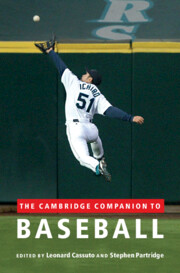Book contents
- Frontmatter
- Introduction
- 1 The rules of baseball
- 2 Baseball in literature, baseball as literature
- 3 Babe Ruth, sabermetrics, and baseball’s politics of greatness
- 4 Not the major leagues: Japanese and Mexican Americans and the national pastime
- 5 Baseball and the color line: from the Negro Leagues to the major leagues
- 6 Baseball and war
- 7 Baseball and the American city
- 8 Baseball at the movies
- 9 The baseball fan
- 10 Baseball and material culture
- 11 Global baseball: Japan and East Asia
- 12 Global baseball: Latin America
- 13 Cheating in baseball
- 14 Baseball’s economic development
- 15 Baseball and mass media
- A guide to further reading
- Index
4 - Not the major leagues: Japanese and Mexican Americans and the national pastime
Published online by Cambridge University Press: 28 July 2011
- Frontmatter
- Introduction
- 1 The rules of baseball
- 2 Baseball in literature, baseball as literature
- 3 Babe Ruth, sabermetrics, and baseball’s politics of greatness
- 4 Not the major leagues: Japanese and Mexican Americans and the national pastime
- 5 Baseball and the color line: from the Negro Leagues to the major leagues
- 6 Baseball and war
- 7 Baseball and the American city
- 8 Baseball at the movies
- 9 The baseball fan
- 10 Baseball and material culture
- 11 Global baseball: Japan and East Asia
- 12 Global baseball: Latin America
- 13 Cheating in baseball
- 14 Baseball’s economic development
- 15 Baseball and mass media
- A guide to further reading
- Index
Summary
In the United States, baseball's reputation as the country's national pastime has largely come from its history as a professional institution. Major league stars from Harry Wright in the 1870s to contemporary celebrities like Alex Rodriguez, along with legendary clubs like the New York Yankees, have long been the face of baseball and have overshadowed the game at the amateur level. One reason is because many standout amateurs ended up in the majors. Additionally, large media outlets and corporate sponsors used their resources to create larger-than-life figures. Finally, generations of mainstream fans took to the professional game, attracted by its seeming egalitarian characteristics. Marketed as a display of democracy, professional baseball has had no equal when it comes to its symbolism of American values. After all, claimed its partisans, in what other forum could a person like Babe Ruth rise from humble origins to international stardom?
Even in the nation's black community, the professional game had an avid following. Deprived of the opportunity to play in the major leagues until 1947, African Americans created their own leagues by 1920. In their heyday, the strongest ball clubs played in major league stadiums, got national attention from the black press, and drew respectable crowds. To match their counterparts in the majors, black baseball had its share of legendary figures who gained international fame, particularly in the Caribbean . But while professional baseball's heartbeat was strong and steady, the game outside these ranks, particularly in many of the nation's ethnic communities, was vibrant and culturally significant.
- Type
- Chapter
- Information
- The Cambridge Companion to Baseball , pp. 49 - 60Publisher: Cambridge University PressPrint publication year: 2011



